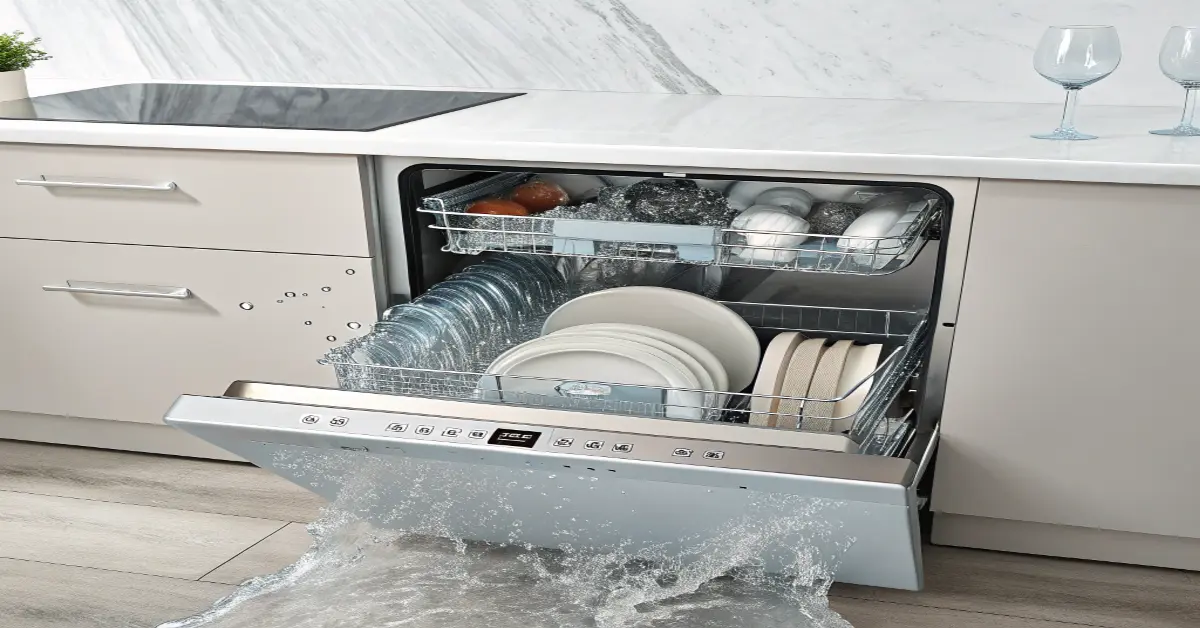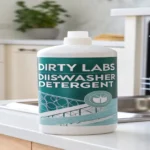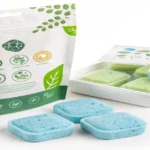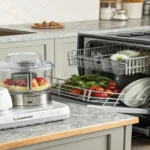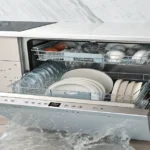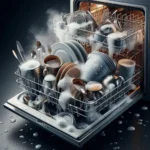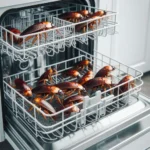Have you noticed that your dishwasher fills with water then stops, leaving you wondering what went wrong? This common issue can be both frustrating and inconvenient, especially when you’re relying on your dishwasher for clean dishes.
As someone who has dealt with this headache firsthand. (and has helped countless others), I’ll explain everything you need to know about this common but fixable problem.
Whether you have the Whirlpool brand you’re using or another brand that’s causing you grief. This guide will help you get to the bottom of it.
The Mystery Behind a Dishwasher That Fills and Stops
Do you realize that sinking feeling when you listen to your dishwasher replenish with water, most effectively to be met with silence?
I’ve been there. After consulting with several appliance restore experts and diving deep into the technical manuals, I’ve found that this difficulty normally boils down to three key culprits.
Let me write it down for you in simple English. The most common reasons I’ve encountered consist of:
- A tired water inlet valve that’s ready for retirement
- Drain pump issues (often from those pesky food particles we forget to scrape off)
- Control board gremlins (yes, that’s what I call electrical issues)
- A circulation pump that’s decided to take an early vacation
Is Your Water Supply Playing Nice?
Here’s something most people don’t think about right away – your water supply system. Just last week, I helped my neighbor Sarah diagnose what she thought was a major dishwasher malfunction.
Turns out, her water line had a subtle kink that was causing all sorts of drama.
First things first, let’s check some basics:
- Make sure your water valve under the sink is opened all the way
- Look for any obvious kinks in the water line (they’re sneakier than you’d think)
- Check if your water pressure is strong enough (weak pressure = sad dishwasher)
When Good Drains Go Bad
Let me tell you a story about my dishwasher drama. I once spent hours troubleshooting my Whirlpool, only to discover a piece of plastic wrap had created the world’s most annoying clog.
The drain system is like your dishwasher’s circulatory system – when it’s blocked, nothing works right.
Here’s what you should look for:
- Remove and clean that drain filter (you’d be amazed what ends up in there)
- Check for any kinks in the drain hose (they love to hide behind cabinets)
- Listen for unusual gurgling sounds (your dishwasher shouldn’t sound like a coffee percolator)
The Heart of the Matter: Circulation Pump Problems
Think of your circulation pump as the heart of your dishwasher. When it’s not happy, nothing works right.
After seeing hundreds of dishwasher repairs, I can tell you that pump issues are more common than you might think. Warning signs to watch for:
- Strange noises (grinding, humming, or buzzing)
- Dishes coming out still dirty (even when they’re not that dirty to begin with)
- Water not reaching those top-rack glasses
When Your Control Board Gets Confused
Modern dishwashers are computers that wash dishes. Sometimes, like any computer, they just need a good reset. But other times, the problem goes deeper.
Here’s what I’ve learned from years of dealing with these electronic brains:Common symptoms of control board issues:
- Random stopping and starting
- Lights flashing like a disco party
- Buttons that respond when they want to (if at all)
The Big Question: DIY or Call the Pros?
Let me be straight with you – I’m all for DIY repairs when they make sense. But sometimes, calling in a pro is the smartest (and cheapest) move in the long run.
Here’s my honest take on when to tackle it yourself and when to wave the white flag:
| DIY-Friendly Tasks | Leave to the Pros |
| Cleaning filters | Electrical repairs |
| Checking hoses | Pump replacement |
| Basic maintenance | Control board issues |
Keep That Dishwasher Happy: Maintenance Tips
Do you know what they say about an ounce of prevention? Well, it’s especially true for dishwashers. Here are some real-world maintenance tips I’ve gathered over the years:
Monthly Tasks:
- Give those filters a good cleaning (seriously, just do it)
- Wipe down the door seals (they get grosser than you think)
- Run an empty cycle with a cup of vinegar (works wonders)
Brand-Specific Quirks and Solutions
Each dishwasher brand has its personality. After working with different models for years, I’ve noticed some patterns:
“Whirlpool dishwashers tend to be workhorses, but they’ll let you know when they’re unhappy with specific error codes. KitchenAid models can be a bit more subtle about their issues.” – From my repair notebook
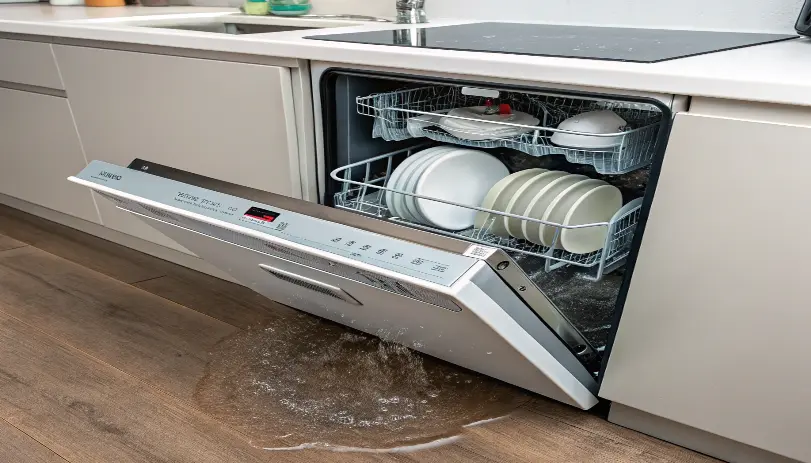
When to Say Goodbye to Your Old Friend
Look, I get it – nobody wants to replace an appliance if they don’t have to. But sometimes, it’s the smartest move.
Here’s my honest advice about when to consider replacement:
- If your dishwasher is older than your middle schooler
- When repair costs make your wallet cry
- If you’re constantly playing repair whack-a-mole
Understanding Your Dishwasher’s Behavior
It can be especially frustrating when Whirlpool adds water to the dishwasher but stops mid-cycle.
Whether you are dealing with a newer model or a 5-year-old model, it is important to understand the root cause.
The washing cycle can be interrupted for several reasons. From faulty water inlet valves to problems with the electronic control panel…
Common Issues Across Different Brands
Although this guide focuses on Whirlpool models, similar issues affect other brands, including LG dishwashers, GE dishwashers, and Maytag units.
The soap dispenser may not turn on. The spray wand may be clogged. Or water at the bottom of the dishwasher may accumulate.
Technicians who specialize in home repairs can diagnose whether the propeller needs to be replaced or if the motor needs to be modified.
Troubleshooting Steps
Before you shut off the water or call the home repair pros, check for any signs of obvious problems.
Inside the door and around the tub, look for calcium and magnesium buildup that could be affecting water flow.
The dishwasher’s water inlet valve might need inspection, and the water supply line should be checked for kinks or blockages.
Professional Repair Considerations
When the dishwasher keeps stopping or isn’t getting water properly, it’s time to consult an expert who specializes in appliance repair.
Look for technicians with good ratings with BBB to ensure quality service. They can verify if you need a new circulation pump or if the electronic control board requires replacement.
Maintenance Tips and Prevention
To maintain clean dishes and proper operation:
- Regularly check the spray arms for blockages
- Monitor the water flow during each wash cycle
- Clean the bottom of the dishwasher monthly
- Ensure the valve remains open and functional
- Run a cycle with cleaning solution periodically
When to Replace vs. Repair
If your dishwasher is responsible for circulating water but stops running frequently, consider whether repair or replacement is more cost-effective.
A model number check can help determine the unit’s age and availability of parts that are easy to replace.
Remember: Before starting any repair work, understand and agree that some issues might require professional intervention.
If you’ve tried so far to fix issues yourself without success, it’s time to locate the water shut-off and contact a qualified technician.
“The key to maintaining your dishwasher is regular inspection and prompt attention to any operational changes.” – Home Repair Professional
This comprehensive guide should help you navigate common dishwasher issues, whether you’re dealing with a Whirlpool, GE, or any other brand.
For specific model concerns, always check your inbox for manufacturer updates and verify your email for warranty information.
FAQs
Q: My dishwasher fills up but then just sits there like a pond. What gives?
A: Nine times out of ten, this is either a drain issue or a pump problem. Start with checking for clogs – you’d be surprised what can end up in there.
Q: How often should I clean my dishwasher filter?
A: Monthly is ideal, but let’s be real – every other month is better than never. Just make it part of your routine.
Q: Is it normal for my dishwasher to make weird noises?
A: Some noises are normal, but if it sounds like there’s a rock band in there, something’s probably wrong.
Key Things to Remember:
- Always start with the simple stuff (clogs, kinks, filters)
- Keep up with basic maintenance (it does help)
- Know when to call in the cavalry (some repairs aren’t worth DIYing)
- Document any error codes (they’re like your dishwasher’s secret language)
- Trust your gut – if something seems off, it probably is
Remember: Your dishwasher wants to be your friend. Treat it right, and it’ll keep your dishes sparkling for years to come. And hey, if all else fails, there are always paper plates (just kidding, please don’t do that to the environment).

I’m Ian Welkins, a seasoned professional in the kitchen industry. My passion now drives me to provide invaluable insights into the world of top-notch kitchen products. With years of hands-on experience, I’m your go-to source for culinary excellence.
